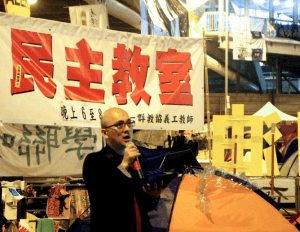The scourge of Liberal Studies
- 2015-01-09
While pro-government lawmakers call to reform Liberal Studies, subject teachers and academia criticise them for not tackling the problems at heart

be left out in the discussion on Liberal Studies
After the release of the Diploma of Secondary Education examination report on Liberal Studies in April, the inter-disciplinary subject is once again a matter of public contention.
Demonstrations in recent years have shown a steady growth in the number of student advocates, most notably in the Occupy Central protests, the North East New Territories New Development Areas and the dock strike. The introduction of Liberal Studies has been suggested by a number of legislative councilors to account for this phenomenon.
Reforms they have called for in light of the subject's first midterm review in November propose trimming the topic ‘rule of law and socio-political participation' in the syllabus, reverting Liberal Studies to an elective and incorporating the concepts of ‘One country' and ‘Basic Law' to the course. But teachers of Liberal Studies have slammed the attribution and believe these reforms futile.
"Problems exist in society - Liberal Studies simply introduced students to a wide variety of concepts like human rights and democracy," said Mr Cheung Yui-fai, the Education Research Department director of the Hong Kong Professional Teachers' Union and a teacher of Liberal Studies.
"In class, we discuss opinions of different stakeholders to have a full picture of the issue. After all, it is still up to students' judgment in whether or not to participate in social movements."
Gary Cheung, 15, is a convener of a secondary student social issues concern group, and was one of the 511 protesters arrested in July for an illegal sit-in at Chater Road. He believes that it's not the influence of Liberal Studies, but the government's incompetence that drummed up the number of student advocates.
"How I felt [about the government] at that time was built upon what was really happening and reported in the media rather than [what I learned in] school," said Gary.
Despite the whiplash from teachers and secondary students, members of the Democratic Alliance for the Betterment and Progress of Hong Kong met with the Education Bureau (EDB) in October to discuss trimming the content of ‘Rule of Law and socio-political participation' from the subject's syllabus.
While most teachers generally accept this amendment, Mr Cheung disagrees that the subject led to the upsurge of young bloods in mass protests and points out that a reduction in the content of the aforementioned topic was not stated during the mid-term review.
Besides scaling down the subject, Mr Cheung believes the inclusion of ‘one country' and ‘The Basic Law' into the syllabus could revive the fear of a quasi-Moral, Civic and National Education episode where tens of thousands of young protesters chastised the "brainwashing" curriculum and took to the streets in 2012, resulting to the subject being shelved.
A third idea put forward by progovernment lawmaker Dr Priscilla Leung Mei-fun, convener of the Liberal Studies Education Concern Group was to de-politicize the compulsory subject and to make it an elective course for students instead.
However, legislator Mr Ip Kinyuen, who represents the education constituency, retorts that it could weaken the foundation of the curriculum and jeopardise the foreign accreditation of the diploma.
After the first mid-term review, the EDB together with the Hong Kong Examinations and Assessment Authority and the Curriculum Development Council concurred in a similar Liberal Studies examination syllabus and format for the next six years with a slight reduction of certain topics that teachers regard as too difficult for students.
But the Bureau admits that there is still room for improvement. A second consultation will begin in late November and those results are scheduled to release July next year.
By Christy Leung
Edited by Tsau Jin Cheung
《The Young Reporter》
The Young Reporter (TYR) started as a newspaper in 1969. Today, it is published across multiple media platforms and updated constantly to bring the latest news and analyses to its readers.

One Moment

Call to tighten monitoring of Roadshow




Comments